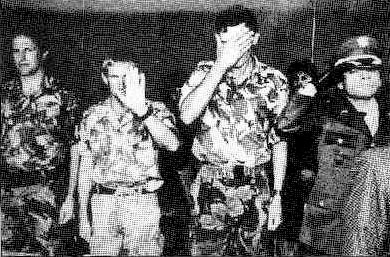|
While only a few months ago, the war in Afghanistan was hailed as a total success, and opponents of the military adventure were roundly condemned as traitors and appeasers, we find ourselves in the early stages of a truly global war. US, British and Canadian forces continue the fighting in Afghanistan.

British military advisors embarrassed to be photographed at a passing out ceremony of an elite Colombian army unit, 1995. After Amnesty International
US troops have expanded their operations to the Philippines and Georgia, and are currently dismantling their principle air base in Saudi Arabia and moving it to Qatar in order to side step Saudi opposition to attacking Iraq.
On 20th February 2002, President Pastrana unilaterally ended the peace negotiations with the FARC-EP, and 2 hours later started the carpet bombing of the previously demilitarised zone, using US intelligence to pinpoint FARC troops and installations.
Even before September 11, US policy towards Colombia was undergoing a subtle change away from the questionable rhetoric of a war on drugs towards open admission of a war against the insurgency and in protection of US economic interests in Colombia. The overtly military nature of the US ‘war on drugs’ had been widely criticized. A Colombian judge had ordered the suspension of the fumigations, and a bill was being considered by the Colombian House of Representatives, for an end to the fumigations due to environmental and health concerns. Many observers, including Klaus Nybold, the head of the UN Drug Control Programme, had questioned why the US was targeting only FARC controlled territory. According to Nybold, ‘the paramilitaries are far more involved in drug trafficking than the FARC, and the Colombian government has largely ignored this fact in order to focus its war on the guerrilla.’
In August 2001, the US authorities went to extraordinary (and largely illegal) lengths to frame the 3 Irishmen arrested in Bogotá after leaving the demilitarised zone, and casting them and the FARC-EP as players in an international drugs and terrorism conspiracy. This propaganda has continued, with Republican Senator Henry J. Hyde, chair of the Senate International Relations Committee, denouncing the IRA as responsible for enabling the FARC-EP to more effectively kill US military and civilian personnel. In December 2001, George Bush underlined this shift in policy when he announced that ‘when we fight drugs, we fight terror.’
The hawks in the White House are now lobbying stronger than ever for the US to support the war against the Colombian insurgency. In March of this year, George Bush, General Fernando Tapias, head of the Colombian armed forces, and Asa Hutchinson, head of the DEA (Drug Enforcement Agency), have echoed Carlos Castaño in calling for Congress to allow funds from Plan Colombia to be diverted directly to counter insurgency operations. According to Hutchison, ‘the US will not leave Colombia alone in the fight against terrorism.’
The US Congress in currently considering a plan to provide a further $98 million, to set up, train and equip a new anti-guerrilla battalion to carry out counter insurgency operations around the Caño Limon oil pipeline, an asset of Occidental Petroleum. It is inevitable that the plan will be approved. Only 2 weeks ago, Congress themselves passed a resolution urging the White House to do more in helping Colombia fight terrorist organisations and the scourge of illegal narcotics. Bush has asked for another $35 million for as yet unspecified military assistance to Colombia, on top of the $98 million for the Occidental pipeline protection. Needless to say, Occidental are a major donor to the Republican Party. This proposal contains not a mention of the war against drugs, it is an open escalation of US involvement in the war against the Colombian people.
Congress is also expected to raise the limit of US military and civilian personnel allowed to be operating in a military capacity in Colombia at any one time. The limit currently stands at 400 of each. The 400 official military personnel are largely involved in training and intelligence work. The so called civilians, almost exclusively ex US special forces, are paid for by US taxpayers through mercenary firms such as DynCorp, Military Professional Resources and Virginia Electronics. They are directly involved in combat operations, from a squadron of ex Navy Seals patrolling the rivers of Putumayo, to flying helicopters and aeroplanes in combat missions, although they are currently prohibited from manning the guns or bombing systems.
These numbers do not include CIA or Defence Intelligence Agency (DIA) personnel working with Colombian military intelligence, a long time hotbed of paramilitary collaboration. US military sources admit that the use of private military contractors and ‘civilian personnel’ is an attempt to avoid the public criticism of US casualties and fatalities that became so strong during the Vietnam war. The deaths of 3 such civilian personnel so far in Colombia, and the complete lack of reaction in the US media suggests that the plan is working.
Similarly the British media has failed to mention the role of the SAS in Colombia’s dirty war, despite its wide reporting in the Colombian press. El Tiempo of 3rd February 2002, ‘Infierno en la jungla’ reports on the activities of the ‘jungle commandos’ including lurid accounts of the killing of guerrilleros. The jungle commandos are proud to admit that they were trained by the SAS. It is time that Tony Blair explained why the British armed forces are training the army with the worst human rights record in the Western hemisphere.
David Rhys-Jones
|






